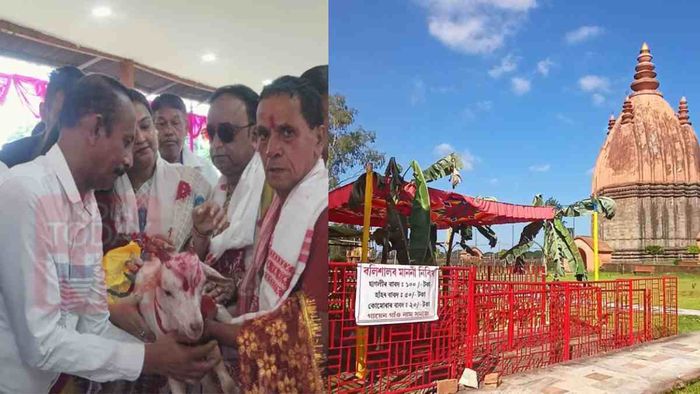Why in Assam's Sivasagar Durga Puja prasad on Ashtami is first sent to a Muslim family
On Ashtami day, the Doullah family, who used to play 'dhak' (traditional instrument) at the Devi Dol, is offered 'Durga Puja Prasad' including a goat as a token of gratitude

- Oct 03, 2022,
- Updated Oct 03, 2022, 7:41 PM IST
In Assam’s Devi Doul, with its ancient history and exemplary tradition, lies a glowing example of communal harmony. A century-old tradition that makes a Muslim family part of the Durga puja celebration.
On Ashtami day, the Doullah family, who played the ‘dhak’ (traditional instrument) at the Devi Doul since the Ahom reign, is offered 'Durga Puja Prasad' including a goat as a token of gratitude.
Tosmia Doullah, daughter of late Monirud Doullah went to the Devi Doul on October 3 following century-old family tradition on Maha Ashtami. Tosmia is ecstatic because she will be remembered as the one who witnessed the resurrection of the custom.
Also Watch:
Talking exclusively to IndiaTodayNE, Tosmia Doullah said, “It is a very old tradition which has been in practice since the 19th century. This practice is believed to have been first adopted during the reign of Ahom kings in the medieval period. My ancestors used to beat 'dhak' in the temple but discontinued it due to some circumstances. In the Sivasagar district of Assam, we don't have a such communal conflict between Hindus and Muslims. Me and my family even went to the temple, paid our obeisance to the deity, and performed puja Archana as per tradition”.
Basanta Gogoi, secretary of the Temple development board stated, “The temple that was constructed during Swargadeo’s reign, has seen the participation of Doullah family with great fervour as they used to play the dhak. Having a close connection with the tradition since the reign of the Ahom Kings, the Mahashtami puja prasad is hence first presented to the Doullah family and Konseng Borpatra Gohain family. Continuing and preserving the century-old tradition, we have distributed the Ashtami Puja Prasad along with a live goat on October 3 at 2 PM to Doullah and Konseng Barpatra Gohain family who were the senior members of the council during the Ahom reign. “
The practice is believed to have been first adopted during the time of Ahom rule. In different parts of Assam as well as in the historic Sivasagar, every puja pandal designed to worship Maa-Durga, as well as the historic Devi Doul on the banks of Barpukhuri in Sivasagar, is also organized extensively.
This unique yet exemplary tradition of Sivasagar’s Devi Doul temple epitomizes communal harmony and brotherhood during this critical time of communal discord influenced by political and social elements.
Today, on the day of Shashthi, devotees are seen flocking to the historic Devi Doul to pay their obeisance to Goddess Durga. Traditionally, Balihaal (slaughtered house) has been prepared for small and big sacrifices.